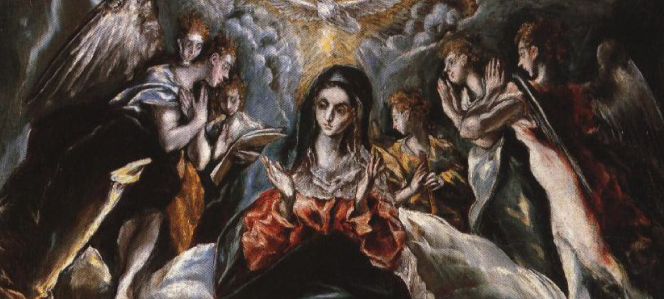One of the tragedies of the Protestant Reformation is that it resulted in a lot of Protestants squeamish about talking about the Virgin Mary, and a lot of Catholics squeamish about talking about grace and predestination (in both cases, out of a fear of the other side’s perceived excesses). In reality, if you want to know what God’s predestination looks like, look to the Virgin Mary. And you can’t understand Mary without understanding predestination.
If you pay attention, you’ll often see that on Marian feast days, the Church will include a reading from St. Paul about grace and/or predestination. For example, tomorrow is the Feast of the Immaculate Conception, and the Second Reading is from Ephesians 1:3-6, 11-12:
Blessed be the God and Father of our Lord Jesus Christ, who has blessed us in Christ with every spiritual blessing in the heavenly places, even as he chose us in him before the foundation of the world, that we should be holy and blameless before him. He destined us in love to be his sons through Jesus Christ, according to the purpose of his will, to the praise of his glorious grace which he freely bestowed on us in the Beloved.…In him, according to the purpose of him who accomplishes all things according to the counsel of his will, we who first hoped in Christ have been destined and appointed to live for the praise of his glory.
In other words, Mary isn’t chosen because she’s so great; she’s so great because she’s chosen. That’s a message that both Protestants and Catholics should be able to get behind. The same God who, through his grace makes us into brothers and sisters of Jesus Christ (making us holy in the process), by a singular grace kept Mary from all sin for her unique role as a mother to Jesus Christ.
Fr. Mitchel Zimmerman, in his homily for the day, pointed out that it would be easy to fall into envy—God preserved Mary from all sin, but lets the rest of us suffer through struggling (and often failing) in the fight against sin. St. Augustine makes a similar point in a commentary on John 5:1-18, after Jesus goes to Bethesda, where a large number of the sick were, and healed one of them: “There lay so many there, and yet only one was healed, while He could by a word have raised them all up.”
But in both cases, the grace shown to a single individual isn’t just for their private good, but for the good of all of us. Some people are given more than others—more gifts, more talents, and even more grace—but what’s given is given for sharing. Underlying the surface level inequality is divine justice, for “Every one to whom much is given, of him will much be required; and of him to whom men commit much they will demand the more” (Luke 12:48).
The Virgin Mary is given more graces than any creature in history, because she has the most special and unique role, as the hinge of the Incarnation, the woman from whom Jesus Christ takes flesh, the woman who conceives, bears, births, and raises Jesus Christ, mothering him, serving him, and following him even to the cross. For nine months, she was his sanctuary and his earthly Temple.
God preserves her from sin, so that the Ark of the New Covenant will be a spotless and pure abode for our Lord. In exchange for the much that she has been given, much is expected. This is fulfilled in her ready responsiveness to Christ, but it doesn’t stop with the end of her earthly life. After all, the Virgin Mary is given to the world for all of us, because she’s given to the world for the sake of Jesus’ mission. And that mission is ongoing. So it is because God chose Mary from all eternity, purified her, and brought about the Incarnation (and our subsequent salvation) through her free cooperation that we can count on her to continue to give freely and generously from the wealth of graces which she has received. Santa Maria, Immaculata, ora pro nobis!
